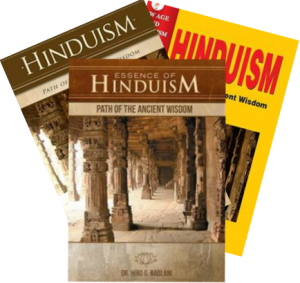All religions believe in the power of prayer. God, however, is not only omnipotent and omniscient; He is also our most benevolent mother and father. Only He would know what is best for us at a given time. Accepting the will of God is indeed part of a good prayer. When we pray with utmost sincerity, there is always a change of our heart toward divinity and virtue. This is indeed the most secure benefit, which never fails to occur from a forthright and genuine prayer. Prayer brings a treasure of blissful joy. Doctor Swami, an esteemed saint of the Swaminarayan sect, says “Prayer is both the exercise and rest for the soul. It is the essential food, too, and the cleansing shower. Prayer may take time to show the result, but no sincere and truthful prayer ever goes unheard.” 113
Prayer is the most important tool of any religious activity. We may perform many good and noble deeds, but these would not be considered spiritual until we add a touch of the Divine to these. A brilliantly clever person may do amazing things but could be, at the same time, a good or a bad person. A truly spiritual person, however, is always a noble being. Hindu seers of the yore created a very intimate connection with the Divine by prayers and meditation.
Hindu sages have prompted mankind to pray for the divine guidance so that we may walk on the right path. We may also pray to know our personal duty ‘svadharma’ in any situation. We may visualize mentally the picture of our ishta-devta for more effective help and guidance.
Hindu seers envisaged that we need God’s grace for the emancipation of our soul. Good and noble deeds alone are not enough. With prayer and worship, in utmost sincerity and humility, and with total surrender at the lotus feet of the Lord, we may obtain His grace. According to Hindu philosophy, God does not intervene until a special request is made. Prayer renders purity. When we sincerely pray, we cannot, at the same time, think nor do anything impure. To pray and simultaneously hate anyone is incompatible. Nor we may scheme to cheat when we are in the midst of a truthful prayer. It is said that God will answer the prayers of those who are pure in mind and body.
Said Pramukh Swami:
If someone has harmed or hurt you, don’t retort in the same manner. Instead, respond with calmness and with goodwill and prayers. Pray that the other person should see the divine light and understand properly. Pray for his welfare. The vibrations sent spiritually will always bear powerful results, both to the person who is thus praying and sending the good wishes, as well as to whom these are directed. This is the principle of religion and spirituality in everyday life.114
Prayer also makes us humble. When we kneel down before God, we at once dispense with our pride and arrogance. Ego and arrogance are closely associated. With prayers, we may be rid of both of them. Prayer is empowering. Time and again we come across the futility of confronting the odds in our lives. We simply become helpless spectators, even as tragedies flow past us. With prayer, we get connected to the infinite power of the Divine and use it for our great benefit. Prayer brings peace and a sense of security. With total surrender to our Supreme Lord, we attain the serenity and quietness, even when tough life situations surround us. In some mystical way, God always helps a person who sincerely prays. This is borne by the experience of most great persons of the world. There simply are no bounds and limits to the infinite treasures of the Divine.
Medical practitioners, scientists, and politicians alike have repeatedly kneeled down and endorsed the high value of prayer. Sages regard prayer as a spiritual substitute for worry, our most potent enemy! In estranged relationships, prayer becomes our soothing repose. Prayer, however, is not just for mystical benefits; rather, it yields tangible results in most trying circumstances. Often, as we are not able to contain the evil of others, we might pray for them. Prayer is the magical link with God, in the opinion of Paramahansa Yogananda.
Hindu sages sought God for different reasons, in different ways, and in many different forms. They sang of the Lord’s praises in abundance and with passion. But the Rishi was constantly aware of the unity of all manifestations in one Supreme Being, as is clearly stated in this hymn of the Rig Veda: “They call Him Indra, Mitra, Varuna, and Agni. The being is one, but sages call him variously.” 115
Hindu sages composed many beautiful universal prayers:
“Common be your prayer,
Common be your desires,
Common be your hearts,
United be your intentions,
Perfect be the union amongst you.”
—Rig Veda X, 191–3, 4
The universal nature of the Hindu faith is very visible in this prayer.
“Gods, May we hear with our ears what is auspicious.
O Ye adorable ones, May we see with our eyes what is auspicious.
May we sing praise to ye and enjoy with strong limb and body the life allotted to us by the Gods.”
—Vedic
Auspiciousness and goodwill (sadbhavna) has been a marked feature in Hindu philosophy.
“May there be peace in heaven. May there be peace in the sky.
May there be peace on earth. May there be peace in the water.
May there be peace in the plants. May there be peace in the trees.
May there be peace in the Gods. May there be peace in Brahman.
May there be peace in all. May that peace, real peace, be mine.”
—Vedic
Peace, or shanti, is invoked repeatedly with great passion.
“May the winds bring us happiness.
May the rivers carry happiness to us. May the herbs give us happiness.
May the night and day yield us happiness.
May the dust of the earth bring us happiness.
May the heavens give us happiness.
May the trees give us happiness.
May the sun pour down the happiness. May the cows yield us happiness.”
—Taittiriya Aranyaka X, 39
All nature gods are invoked to grant us happiness and prosperity.
NOTE: All prayers are adapted from Swami Yatiswarananda. Universal Prayers. Chennai, India: Sri Ramakrishna Math, 200




